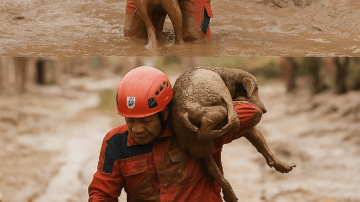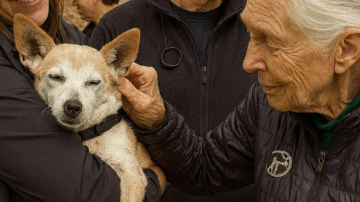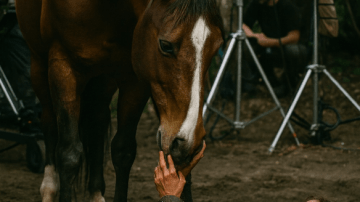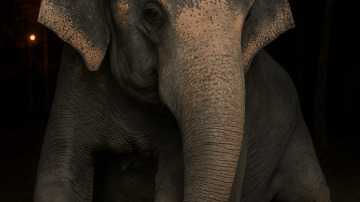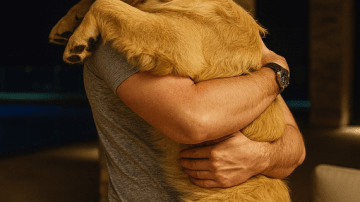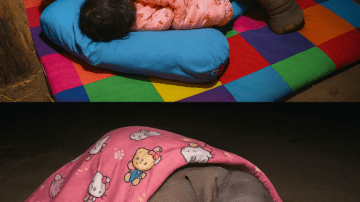The call for help came late one afternoon. A message from a concerned passerby: there was a stray dog hiding in the grass field on the edge of town. She had been there for several days, surviving only on scraps tossed by kind strangers. Rumors spread quickly—she had recently given birth and was guarding her litter.

We arrived at the spot and scanned the thick grass. And there she was—a thin, trembling mother, her ribs showing beneath her dull coat. Yet her eyes, sharp and protective, never left the bundle beside her. She had every reason to be afraid, and when we drew closer, she bared her teeth and growled, her whole body trembling with the effort of defending her young.
We backed away, not out of fear for ourselves but because we knew—one wrong move could terrify her further, and the puppies would suffer. We returned to the car and brought back food, hoping to ease her suspicion. Approaching again, we laid down snacks and whispered reassurances. At first, she refused, too wary to trust. But with patience, gentle words, and time, she finally gave in. The crunch of kibble broke the silence, and we knew we had taken the first fragile step toward trust.
As she ate, we stole glances at the tiny bodies beside her. Some lay still. Too still. Our hearts sank. Were they alive? We needed to help—but only with her permission.

She allowed us closer. That was when we saw the truth.
One puppy twitched faintly, a breath escaping its fragile lungs. But the others… their bodies were cold, limp, lifeless. The mother whimpered, nuzzling them, licking their motionless faces, as if begging them to wake. Desperately, she picked one up in her mouth, then another, carrying them toward us as though pleading: Please, don’t leave them. Save them.
The sight broke us. Tears welled unbidden. How could we explain to her that miracles do not always come?
Out of five, only one puppy still breathed. We gathered them all, placing the lifeless ones in a blanket, and gently coaxed the mother into a crate. She would not let go of the surviving pup, clamping it gently between her teeth, eyes full of terror at the thought of losing her last baby.
That night, we buried the four tiny bodies. The mother stood over the small graves, restless, her eyes shining with sorrow. She remembered each one. But when she turned to the sole survivor nestled in her arms, her expression changed. Grief gave way to fierce determination. This child she would not lose.

At home, we worked tirelessly. We nourished her with supplements and rich food so her body could produce milk. Though weak and gaunt, she never stopped caring for her pup. She curled around it, nursed it, and guarded it as if her whole soul was tied to its heartbeat.
Days later, fate intervened again.
A woman arrived at our door, holding two tiny puppies wrapped in a towel. Their mother had been poisoned, cruelly taken from them. Of the four pups in that litter, only two survived. Both were healthy, but without a mother, their chances were slim.
The woman had been following our rescue work for two years. She came not with demands but with hope: could we help save these orphans?
We looked at each other, uncertain. Could our grieving mother accept them? Would she see them as her own? Or would her instinct reject them?
We rubbed the orphans with the scent of her pup, mingling their smell so they might be recognized as kin. Then, cautiously, we placed them near her. She stiffened, confused, nose twitching as she inspected the newcomers. For a long moment, she hesitated. Our breaths caught in our throats.
And then—she lowered her head, licked their tiny faces, and pulled them close. No growl, no rejection. Only acceptance. Relief washed over us. Against all odds, she had chosen love over fear.
From that day forward, she was no longer the mother of one, but the mother of three.
She fed them, cleaned them, and nestled them against her chest. They squirmed and whimpered like siblings, unaware that fate had once threatened to separate them forever. Watching them nurse side by side, we felt as though the four lost souls had returned in spirit, their absence partly healed by this second chance.

The surviving pup from her first litter grew stronger each day, its frail body filling out, eyes brightening. The two orphans flourished under her care, their bellies round with milk, their cries full of life. And the mother—once thin, ragged, and heartbroken—found purpose again.
Her instincts were extraordinary. She rarely left their side, refusing even food until she was sure they were safe. When we offered her bowls of nourishing meals, she ate only after each pup was satisfied. We supplemented her diet with vitamins and proteins to keep her strength up, for she poured every ounce of herself into keeping her children alive.
Soon, the pups’ playful energy filled the room. They wrestled with each other, tumbled across blankets, and clung to their mother’s tail. She watched over them patiently, correcting them with a gentle nudge when needed. For every cry, she had an answer. For every wobbling step, a watchful eye.
We realized then that she had not only survived the streets—she had survived despair. Her plea that day in the grass was not just for food or shelter, but for the chance to be what she was born to be: a mother. Even when death took four of her children, she did not give up. And when strangers placed two orphans in front of her, she chose love again, without hesitation.
Weeks passed, and the three pups flourished. Their coats grew thick and shiny, their tiny legs sturdy and strong. The once skeletal mother now looked radiant, her eyes brighter than ever. When she played with them, there was joy in every bound, strength in every movement.
She had lost much, but she had gained something greater: the proof that family is not only about blood, but about the love we choose to give.
And so, from a patch of grass where a desperate mother once guarded her fading litter, to a warm home filled with the laughter of three thriving puppies, her story became one of hope. She had carried her plea in her mouth, quite literally—offering her lifeless pups to us in one last attempt for help. We could not save them, but through her resilience, she saved the living.
Today, she lies in her bed, three pups curled around her. Her eyes close slowly, content, no longer filled with fear but with peace. And if you look closely, you’ll see it: the faintest smile on her face, a mother’s smile that whispers—
I did not give up. And because of that, my children live.

